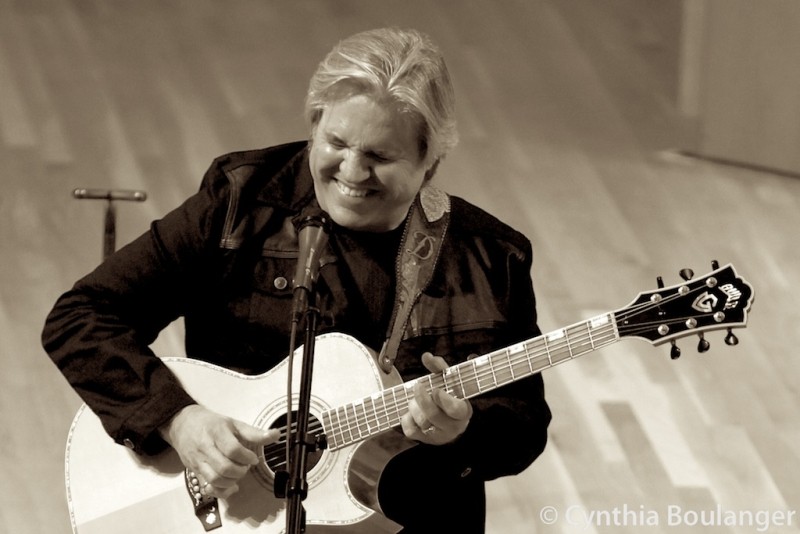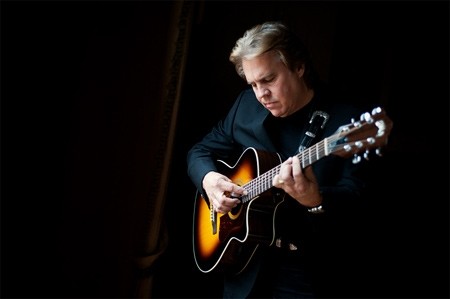A GEM of the bluegrass community, Doyle Dykes has developed an unmistakable style in his half a century behind the guitar. The distinctive fingerpicker has graced stages from the Grand Ole Opry to small town churches, fascinating guitar aficionados and thrilling music fans of all genres.
With lightning-quick hands and an easy, fun-loving presence, Dykes turns a single guitar into a veritable orchestra.
A friend of Randy Woods (“a gift to the area,” Dykes calls the Lowcountry luthier), he’s looking forward to his Randy’s Pickin’ Parlor performance.
We chatted with Dykes about technique, his upcoming LP, 50 Years Behind the Guitar, and his family’s deep roots in music.
I understand Barry Lackey was a huge influence on your playing when you were young. Were you self-taught? Did you take lessons?
DD: As a kid, we didn’t have the type of facilities they have today, as far as learning with all the technology— it’s amazing! You’d never seen Merle Travis on television hardly ever, unless it was on The Porter Wagoner Show. You never really got to see people do that sort of thing.
Barry was the first guy I ever saw play fingerstyle; I didn’t even know that a way to play. I didn’t have a teacher. My dad was a good guitar player. He played with a flat pick and didn’t play that [fingerpicking]style until later on. I got him into it, and he played that way until he died.
I just learned by playing, mostly. My dad showed me some chords, I got a chord book. I had an ear; my family is musical on both sides, my mom and dad’s. We always had music, lots of singing and playing...that’s what the family did when we got together, we’d play music. I was raised around that. My granddad was guitar player, and for 33 years he had me up in church playing early, and I learned to play by ear. I could hear the chord changes. I never did take any private lessons—I guess I started running before I was walking!
What influenced you as you were learning?
Lot of what I mentioned: Merle Travis, Chet Atkins. Les Paul was another I listened to a lot when I was a kid. I also listened to a lot of gospel quartet music, and then the music of the ‘70s when I was growing up got a little more progressive. I used to love Bread—some of the chord changes and all that they did. Chicago was one of my favorite groups, I loved that style; and believe it or not, Barry Manilow! I loved orchestra stuff, I just loved it. I listened to a lot of orchestration type things and found myself trying to emulate that on guitar, so that’s kind of where that style went.
I just never set out to just professional guitar player, I just love playing music and love the guitar. It was a hobby, but as long as I played and made a living doing that, I did okay, you know? If I tried anything else, it never seemed to work as well. Who tells you you’re going to be a professional guitar player until you’re just out there? This is what feeds my family, this is my passion and what I do for a living. I just fell into it.
Listening to orchestral music—that’s really interesting, and makes so much sense. By yourself, you’re handling the bass, the melody...
I play more around the chords. I just look at it sort of like a soloist singing with a piano behind him or her. The melody line should always be up front, and I always play the melody line a little louder, then the background kind of underneath that. And, of course, dynamics are also a big thing. If I was going for anything, that would be one of them.
A lot of the recordings and voicings I use are from quartet music, and that sort of thing—listening to choirs. I traveled with The Stamps early on when I was just a kid and listened to them and The Gatlin Brothers, and they would sing and I would try to emulate that on guitar, too, and that gives you a little bit of a different style than just trying to learn to play something.
You’re doing something so technical that requires so much focus onstage, but you always play with such a fun spirit. This far into your career, does playing still require a lot of focus, or is a lot of it muscle memory?
It depends on the song. A lot of what we do is repetitious. People say, ‘how you remember all these songs?’ Some, you don’t! Others, I go back and have to relearn how to play.
Once you do, and you’re playing, you don’t want to just be hung up and ‘how do I do that?’—you just let it flow. There are certain songs you can pull that off in front of a crowd, but sometimes I ‘ll do something and think, ‘what in the world am I doing this for?’ and just a stretch myself a little bit.
But I think that playing with other people, too, helps, and listening and playing in front of people is a huge thing. I’m used to playing in front of people. A lot of folks aren’t—they freeze up. they say, ‘how do you get to next level?’ If you play by yourself all the time, you’ll never stretch at all. When you do get in front of people and play with another musician, they’ll pull things out of you.
It’s always good to do something that is out of the norm. You don’t have to do it all the time, but it is good for you musically.
For songwriting, do you need to get away and have focus?
It’ll be something I had in my head, or sometimes when I’m warming up at sound check, I’ll find myself playing—‘that’s kind of cool.’ If it stays in my head long enough, it must be viable. A lot of songs get written that way.
A lot gets written on the road. Driving, I’ll have something in my head and will write it—that’ll happen a number of times. Some of my best songs were written that way, where I couldn’t wait to stop and get a guitar! Gitarre 2000 was written that way—some of those songs are the most meaningful songs. If it’s in your head that long, it’s something that’s strong.
You’ve worked with Taylor and Guild on custom guitars; what are you looking for in a custom instrument?
For a fingerstyle guitar, a three-quarter neck is always good. I like for a neck to be rigid, I like for a lot of the energy to be translated through the top of the guitar, and no one does that better than [luthier] James Olsen. The guitar I’m playing with him is the one I really didn’t have anything to do with: it’s his genius, and I wouldn’t change anything.
But if I was having another company build a guitar, I would start with a grand auditorium type size, narrow it down, make it a little thinner than most companies, because I like a quicker response when I’m playing with my right hand. I like a good pickup system.
It’s more of the wood for the tone...sometimes, to get a perfect top, that guitar has to be around awhile to sound as good as an Adirondack top. You can see the grain, and it’s further apart—you have all that energy that gets through the grain of that wood.
What’s coming up for you? Working on any recordings?
This week, actually, there’s something my son is doing for me on the record I’ve been working on. I’ve been playing guitar for 50 years, and we’ve put some things together from my developmental years that had a big influence on my playing.
My uncle on my mother’s side was also very musical...he was one of the most talented musicians. People deserve to hear him, and I want to put some of this music on there. I actually play with him on one song, ‘Little Red Wagon.’ We took what he did, and we added the band with all my family members, the grandkids are singing on there, and my son did the guitar on that one.
I’ve been working on that, and it should’ve been done already, but sometimes I’ve found there are things in life that come first. We have a new granddaughter born not long ago, health issues. Life happens to everybody. When you put other things first that should be first, it happens easily—just not always when we think it should.
Do you have a title or release date?
I planned on calling it 50 Years Behind the Guitar. Grandpa Jones was a great friend of mine...I used to play guitar for him. While I was with him, he was writing book called 50 Years Behind the Mic. I thought that'd be kind of nice, to remember him. Grandpa was a huge influence on me in a lot of ways other than music, too.
I found a tape of Merle Travis and myself playing at Grandpa’s house...I got permission from his family, and I’ll probably put that on there. My brother found a tape of me playing when I was 14. I played along with myself, and hopefully it’ll be entertaining. If we decide not to do it, we’ll put it on YouTube, do something with it...I think it deserves to live.
We’re looking forward to your show at the Pickin’ Parlor.
I think Randy Wood is a gift to that area. He’s such a talented man.
There’s so much—Gregg Allman is in that area. The music of the churches is amazing. A lot of good music comes out of the Savannah area.
I really want to honor Randy, too, and let people know what a gift he is to the area.



